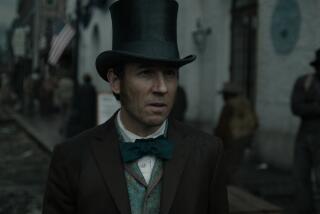Q&A: Coming to the Festival of Books: Scott Martelle
- Share via
Every schoolchild knows that John Wilkes Booth assassinated Abraham Lincoln. But history has more or less forgotten Boston Corbett, the Union soldier who helped hunt down Booth and fired the shot that killed him. As Scott Martelle discovered in researching his new book “The Madman and the Assassin: The Strange Life of Boston Corbett, the Man Who Killed John Wilkes Booth” (Chicago Review Press: 240 pp., $24.95)
Corbett was the 1860s version of a viral celebrity, adored and loathed in equal measure by a divided nation. Not only do Corbett’s religious passions, preserved in archives all over the country, make him a fascinating figure, but he was also a kind of Civil War-era Forrest Gump, popping up in Andersonville Prison, the Philadelphia Centennial Exhibition, a Kansas homestead. His story sheds light on some of the dimmer corners of American history.
A lifelong journalist and currently an editorial writer for the Los Angeles Times, he has published four books of nonfiction. Sitting in downtown’s Grand Central Market recently, he spoke about Corbett and our enduring fascination with the Civil War.
FULL COVERAGE: FESTIVAL OF BOOKS
What first got you interested in Boston Corbett?
When my last book was finished, I was looking around for another subject. My editor at Chicago Review Press asked, “Have you ever heard of this guy named Boston Corbett? He’s the guy who killed John Wilkes Booth, and he had castrated himself in 1858.” As a journalist, I thought, “OK! Yeah. I might be able to find something interesting in that.”
In his time, Corbett was dismissed by most people as a religious kook. The more I got into the papers, I realized he was actually a very complex, interesting character, and I built up a pretty healthy sympathy for him. I’m not a religious person myself, but I was taken with his concept that he wanted to live life every moment the way he thought Jesus would. You have to admire that kind of adherence to a principle, whatever the principle is....
There are very few unturned stones about the Civil War, and what I like about this book is that it’s, as far as I can tell, the first broadly published, in-depth look at Boston Corbett’s life. He’s one of the few characters still standing out there to be explored.
What do you think accounts for our fascination with the Civil War?
The sheer scope of it, and how it still resonates. Our racial divide is built upon slavery, and the violent end to slavery. We’re still battling states’ rights issues. In a lot of ways, the Civil War was the violent confrontation of the ongoing discussion of what we should be as a nation. It was much more of a revolutionary war than the American Revolution, which essentially cast off the British colonial overseers but kept the same political social system; all it really changed was who was in charge. The Civil War was about whether we were going to be a slave-based economic system, and what has superiority, the federal or the state governments.
What’s more rewarding for you, researching or writing?
I kind of like them equally. The research is just a lot of fun. Getting into archives, touching history, holding letters that someone like Boston Corbett wrote. Always talk to the archivists! They know stuff that you don’t think about. Then, when you’re writing, you’re getting inside the head of people, building up a narrative. I’ve been writing as long as I can remember. I got my first newspaper job at the age of 16, and I just keep scratching that itch.
What do you think Boston Corbett would think of America today?
He’d definitely be part of the Christian activist crowd. A lot of the religious issues we’re dealing with today weren’t really part of the national discussion back then, like abortion, capital punishment, that sort of thing. I’m not sure what he’d make of it, but I’m sure he’d be very loud about whatever he thought about it.
He’s a kind of an oddball but otherwise ordinary figure, who just because of where he was that morning, found himself — 100 years before [Andy] Warhol’s 15 minutes of fame thing — famous for a single act. Some things don’t change.
Martelle will appear at the Festival of Books at 2 p.m. April 19.
More to Read
Sign up for our Book Club newsletter
Get the latest news, events and more from the Los Angeles Times Book Club, and help us get L.A. reading and talking.
You may occasionally receive promotional content from the Los Angeles Times.






